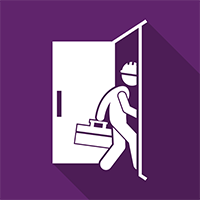-
 Every day, thousands of people are exposed to situations where they are left alone in work premises, when visiting members of the public during their working day, or working from home. There are many risks associated with working in isolation, without the support of colleagues. These risks can include accidents and violence. This online Introduction to Personal Safety for Lone Workers course acts as an introduction to personal safety for lone workers and applies to those that work alone within business premises, mobile workers and homeworkers. This Introduction to Personal Safety for Lone Workers online course covers the legal responsibilities of both employers and employees, some of the common security precautions that can be implemented, practical steps you can take to avoid conflict in lone worker situations and other elements that can contribute to lone worker safety.
Every day, thousands of people are exposed to situations where they are left alone in work premises, when visiting members of the public during their working day, or working from home. There are many risks associated with working in isolation, without the support of colleagues. These risks can include accidents and violence. This online Introduction to Personal Safety for Lone Workers course acts as an introduction to personal safety for lone workers and applies to those that work alone within business premises, mobile workers and homeworkers. This Introduction to Personal Safety for Lone Workers online course covers the legal responsibilities of both employers and employees, some of the common security precautions that can be implemented, practical steps you can take to avoid conflict in lone worker situations and other elements that can contribute to lone worker safety. -
 The Health and Safety (Display Screen Equipment) Regulations contain special directives covering DSE safety. Both employers and employee‐users have responsibilities under the legislation So what do we mean by display screen equipment? The first thing most people think of is a computer monitor. But that’s not the only thing it refers to display screen equipment could also mean laptops, tablet PCs, televisions, smartphones, CNC control pads, portable diagnostic screens or equipment containing cathode ray tubes, or CRTs. Our Display Screen Equipment Awareness E-Learning course is aimed at users of display screen equipment (DSE) and those responsible for assessing display screen equipment. A ‘user’ is anyone who regularly uses display screen equipment for a significant part of their normal work. In practice, if you use display screen equipment continuously for more than one hour a day, then you’re a ‘user’. This Online Display Screen Equipment Awareness E-Learning course fulfils your statutory training obligations and covers, among other things; the correct way to set up and use your display screen equipment safely. Reducing the risk of work related conditions.
The Health and Safety (Display Screen Equipment) Regulations contain special directives covering DSE safety. Both employers and employee‐users have responsibilities under the legislation So what do we mean by display screen equipment? The first thing most people think of is a computer monitor. But that’s not the only thing it refers to display screen equipment could also mean laptops, tablet PCs, televisions, smartphones, CNC control pads, portable diagnostic screens or equipment containing cathode ray tubes, or CRTs. Our Display Screen Equipment Awareness E-Learning course is aimed at users of display screen equipment (DSE) and those responsible for assessing display screen equipment. A ‘user’ is anyone who regularly uses display screen equipment for a significant part of their normal work. In practice, if you use display screen equipment continuously for more than one hour a day, then you’re a ‘user’. This Online Display Screen Equipment Awareness E-Learning course fulfils your statutory training obligations and covers, among other things; the correct way to set up and use your display screen equipment safely. Reducing the risk of work related conditions.Display Screen Equipment Awareness Modules
Introduction Legislation Protecting Your Body Adjusting Your Chair Adjusting Your Screen Work Arrangements Adjusting the Layout of Your Workstation Adjusting Your Work Environment Approved by IIRSM & CPD - Duration 50 mins* -
 This course covers what you need to know about the Control of Substances Hazardous to Health (COSHH) So what do we mean by ‘Substances Hazardous to Health’? In legal terms, these are substances that are classified as “very toxic, toxic, harmful, corrosive or Irritant” under the Classification, Labelling and Packaging Regulation (CLP). This was a new regulation that came into force in January 2009 dovetailing with a set of regulations called REACH. REACH is a European Union regulation concerning the Registration, Evaluation, Authorisation and Restriction of Chemicals, which came into force on 1st June 2007. One of the main aims of REACH is to provide a high level of protection for human health and the environment from the use of chemicals. This Online Control of Substances Hazardous to Health (COSHH) course is aimed at anyone exposed to Substances Hazardous to Health at work and line managers with responsibility for such people. This Online Control of Substances Hazardous to Health (COSHH) E-Learning course will provide candidates with an understanding of substances that cause hazards to health in their work life and guidance on exposure, legislation and risk assessment.
This course covers what you need to know about the Control of Substances Hazardous to Health (COSHH) So what do we mean by ‘Substances Hazardous to Health’? In legal terms, these are substances that are classified as “very toxic, toxic, harmful, corrosive or Irritant” under the Classification, Labelling and Packaging Regulation (CLP). This was a new regulation that came into force in January 2009 dovetailing with a set of regulations called REACH. REACH is a European Union regulation concerning the Registration, Evaluation, Authorisation and Restriction of Chemicals, which came into force on 1st June 2007. One of the main aims of REACH is to provide a high level of protection for human health and the environment from the use of chemicals. This Online Control of Substances Hazardous to Health (COSHH) course is aimed at anyone exposed to Substances Hazardous to Health at work and line managers with responsibility for such people. This Online Control of Substances Hazardous to Health (COSHH) E-Learning course will provide candidates with an understanding of substances that cause hazards to health in their work life and guidance on exposure, legislation and risk assessment.Control of Substances Hazardous to Health (COSHH) Modules
Introducing COSHH Different Types of Hazard Different Types of Exposure Regulations and Approved Labelling Assessing COSHH Risks The Risk Assessment in Practice Exposure Control Staying in Control Training and Emergency Planning Course Summary Approved by IIRSM & Institute of Hospitality - Duration 125 mins* -
 Working safely is in the interest and concern of all staff, both employers and employees. Health and safety is one of the few areas where the law places specific duties specifically on employees so knowledge of where this applies and how to ensure that it is adhered to is vital to protect individuals and businesses. Most workers feel that accidents are something that only happens to other people. The reality is that too many workers are coming to harm by not observing Health and Safety laws and not working to safe systems of work. The physical, mental and financial burden of these accidents can have a huge impact on themselves, their families and their colleagues. The Online Working Safely E-Learning Course covers a wide range of topics including fire safety, asbestos awareness, working at height, COSHH, PPE and electricity. It also covers methods for improving safety performance and methods of protecting the environment.
Working safely is in the interest and concern of all staff, both employers and employees. Health and safety is one of the few areas where the law places specific duties specifically on employees so knowledge of where this applies and how to ensure that it is adhered to is vital to protect individuals and businesses. Most workers feel that accidents are something that only happens to other people. The reality is that too many workers are coming to harm by not observing Health and Safety laws and not working to safe systems of work. The physical, mental and financial burden of these accidents can have a huge impact on themselves, their families and their colleagues. The Online Working Safely E-Learning Course covers a wide range of topics including fire safety, asbestos awareness, working at height, COSHH, PPE and electricity. It also covers methods for improving safety performance and methods of protecting the environment.Working Safely Course Modules
Introducing Working Safely Defining Hazard and Risk Identifying Common Hazards Improving Safety Performance Protecting the Environment Final Assessment Hazard Perception Approved by IIRSM, Gatehouse Awards & CPD – Duration 150 mins* -
 Current legislation set out by the Health and Safety at Work Act along with the HSE’s updated code of practice known as L8, state that companies and building owners have a legal duty to manage Legionella. Our interactive Legionella Management E-Learning training course is aimed at all employers and staff to assist them in identifying the danger that Legionella poses, as well as covering ways to identify and assess sources of risk from Legionella on the premises. Our Online Legionella Management course also gives you enough knowledge to get a Legionella control programme off the ground yourself – or make confident, informed choices when commissioning others to take this on for you. This e-learning course is primarily aimed at building and facilities managers and maintenance professionals that have nominated responsibilities for water systems.
Current legislation set out by the Health and Safety at Work Act along with the HSE’s updated code of practice known as L8, state that companies and building owners have a legal duty to manage Legionella. Our interactive Legionella Management E-Learning training course is aimed at all employers and staff to assist them in identifying the danger that Legionella poses, as well as covering ways to identify and assess sources of risk from Legionella on the premises. Our Online Legionella Management course also gives you enough knowledge to get a Legionella control programme off the ground yourself – or make confident, informed choices when commissioning others to take this on for you. This e-learning course is primarily aimed at building and facilities managers and maintenance professionals that have nominated responsibilities for water systems.Basic Legionella Management Modules
What is Legionella? Risk Areas Legislation Risk Management Water System Monitoring Cooling System Awareness Approved by IIRSM, Gatehouse Awards & CPD - Duration 75 mins* -

The Management of Health and Safety at Work Regulations 1999 requires all employers to have a Health and Safety Policy and undertake a General Risk Assessment appropriate to their business.
Working Together to Safeguard Children (2018) requires all providers working with children, young people and vulnerable adults to have a Safeguarding Policy in place.
The Data Protection Act 2018 is the UK's implementation of the General Data Protection Regulation (GDPR) and requires you to outline how personal data is processed within your school.
It is also good practice to have an Accident and Illness Policy, Complaints and Equalities Policy in place.
Our online tool makes this process as easy as possible. Just complete the questionnaire and your comprehensive document pack will be emailed to you within minutes, covering all aspects of operating a UK-based Dance and Drama School.
This comprehensive Dance and Drama School business pack includes the following documentation;-
- Statement of general policy and arrangements
- General Risk Assessment
- Car parking and External Safety
- Staff Training
- Student Welfare
- Viral Illness and Infectious Diseases (including COVID-19)
- Venue – Spaces/Studios
- Delivery of Classes
- Pointe Work (Note: this section is only relevant if you specifically teach Pointe Ballet Work)
- Singing (Note: this section is only relevant if you specifically teach Group Drama (Musical Theatre Based), Group Singing, and/or Individual Singing Lessons)
- Policy and Procedures on Safeguarding Children & Adults at Risk
- Statutory and legislative frameworks
- Terminology and Definitions
- Overview and Responsibilities
- Responding to a safeguarding incident or concern involving a child or adult at risk
- Reporting a safeguarding incident or concern
- Further advice and guidance
- Recognising and Responding to Abuse
- Code of Behaviour and Good Practice
- APPENDIX 1 - Reporting Suspected Abuse - Confidential Recording Sheet
- NEW - General Data Protection Regulations 2018 Policy
- NEW - Accident and Illness Policy
- Minimum exclusion periods for infectious diseases
- NEW - Complaints Policy
- NEW - Equalities Policy
Once you have received your Document pack you can update it at any time as things change using the link in the accompanying email.
Click below to purchase your Comprehensive Dance or Drama School Documentation Pack.
Following purchase please follow the link in your confirmation email and complete the Questionnaire. Your Documentation Pack will be emailed to you within 15mins of submitting the Questionnaire.
-
-
 The alcohol licensing laws of the United Kingdom regulate the sale and consumption of alcohol. Any organisation, business or individual who wishes to sell alcohol must have a licence. This is obtained from a Licensing Authority. This online Alcohol Personal Licence Holder E-Learning course starts with an overview of UK alcohol licensing laws and the importance of promoting the four key licensing objectives. The three main types of licence are covered, including applications, conditions, representations, and reviews. You’ll learn about the legal duties of personal licence holders and how to deal with Licensing Authorities, along with information relating to objections, fees and hearings. The Alcohol Personal Licence Holder online course will also discuss issues surrounding Temporary Event Notices and mandatory conditions, which are compulsory for all licensed premises. The online Alcohol Personal Licence Holder E-Learning course also looks in detail at the major issue of age verification – and you’ll learn about the licensing laws and best practices as they apply to children and under 18s. Finally, the online Alcohol Personal Licence Holder course outlines the responsibilities involved in alcohol retailing, including drinking guidelines and how to avoid and reduce conflict. This Alcohol Personal Licence Holder E-Learning course is aimed at anyone working in, or wanting a career in the hospitality industry who wants to open up promotion opportunities or to move into a role that requires a personal licence.
The alcohol licensing laws of the United Kingdom regulate the sale and consumption of alcohol. Any organisation, business or individual who wishes to sell alcohol must have a licence. This is obtained from a Licensing Authority. This online Alcohol Personal Licence Holder E-Learning course starts with an overview of UK alcohol licensing laws and the importance of promoting the four key licensing objectives. The three main types of licence are covered, including applications, conditions, representations, and reviews. You’ll learn about the legal duties of personal licence holders and how to deal with Licensing Authorities, along with information relating to objections, fees and hearings. The Alcohol Personal Licence Holder online course will also discuss issues surrounding Temporary Event Notices and mandatory conditions, which are compulsory for all licensed premises. The online Alcohol Personal Licence Holder E-Learning course also looks in detail at the major issue of age verification – and you’ll learn about the licensing laws and best practices as they apply to children and under 18s. Finally, the online Alcohol Personal Licence Holder course outlines the responsibilities involved in alcohol retailing, including drinking guidelines and how to avoid and reduce conflict. This Alcohol Personal Licence Holder E-Learning course is aimed at anyone working in, or wanting a career in the hospitality industry who wants to open up promotion opportunities or to move into a role that requires a personal licence.Alcohol Personal Licence Holder Modules
Introduction Premises Licences Personal Licences and Club Premises Certificates Dealing With Licensing Authorities Types of Businesses Selling Alcohol Representations and Mandatory Conditions Licensing Authority Powers Children and Under 18s Responsibility in Alcohol Retailing On completion of the course we provide you access to our online invigilated examination which can be taken anywhere. Our market-leading examination system delivers the final assessment direct to your candidate via the internet, invigilated using screen sharing and webcam, allowing them to receive their alcohol license quicker and easier without the stress and hassle of visiting an exam centre. Please ask us for further details. Approved by CPD, Institute of Hospitality & Laser awards - Duration 90 mins* plus examination.
